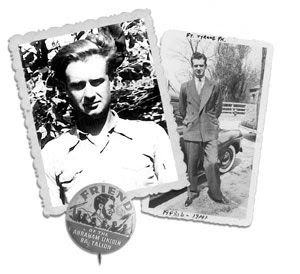
Death is not proud nor is it peremptory.
It is no rigid Prussian officer in a spiked helmet
calling out commands in a military falsetto,
nor even a full-bosomed hospital matron
with eyes the Gorgon would have paid for.
It is false to think our lives are made for
happiness; the pursuit of ephemeral dreams
knocks the moral compass off its mark, leaves
us reeling in the dark; the aims of the American
Republic have disarranged us all since then.
It is extremely hard to convince young men
that what they are, their character, is what they get.
It is neither birth, education, nor application,
nor thrift and toil, nor midnight oil,
that define the course of a man’s existence.
Belief, the very force of bland persistence
can make us blind to the subtle markers
showing here and there upon the trail: how often
do we hear these words “succeed” and “fail”
only in terms of money, pleasure ... feelings?
When we take the measure of all our dealings
in the course of our three score and ten,
(having been statistically exempt, let us say,
from murder, disaster, car-collisions, war),
wouldn't you ask yourself what was it for?
It wasn’t for the money … well, not really,
and it wasn’t for the boss or the job
or the house; nor even for the lack of money
or house or boss or job. It wasn’t for the drugs,
wasn’t for the drink, not even for the wonderful sex
that came and went like a summer shower:
these things we hardly remember at all.
What do we remember? Ask yourself.
Karen, you're such a sweet little thing,
you remind me so much of your mother,
or was it your grandmother? No matter,
would you care to dance? -- Grandfather,
really, you shouldn't be bothering the young girls,
says fat-lipped Mario, the oily bastard
who married my cousin's daughter. I glare
at his Facebook ... no, his MySpace grin,
his sheer, impregnable, unapproachable
idiocy, his wasteland of vacant hollows. I sigh,
give up, and return to the table of Old Ladies.
Death comes down like a benediction,
the taxi pulling up to the door, throbbing,
five or ten minutes early: ready to go?
Well, no. Hang on a sec …
When in pain or misery or despair
it arrives ten years too late.
Fate … which might be too heavy a word
to put upon it, usually and very often
repeats itself, like the old photographs,
see Mam and Dad younger than you are now,
the old portraits, diaries, sketches, samplers,
the books we read as children, the books
we still read now, how we keep the past alive.
Ten years ago I would have punched him.
Now he might punch me back. Couldn't handle
that: where's me fuckin revolver? I was
in the War, you streak of shit, and where the fuck
were you? Not born. Not even here. And now,
dear God, I'm not even here no more.
The dead only become really dead
and pass like wraiths into the shades
when the memory of the living fades.
What of it? A dance, a drink? Fuck this
sitting with the sly old ladies, don't they
know me too well? But the anger
wells up in me. I was a far better man than he was
or ever will be, back in my prime, and I am still
the same man ... but I know I'm not.
The anger. Calm down. Take a pill ... take three.
O, Jesus, take the whole fuckin bottle!
What of it? So come in, you cheery young men,
and carry me out upon your shoulders.
I don’t believe in a Disneyland in the sky, nor any
perennial Auschwitz in the bowels of the earth,
(nor any half-way house inbetween!) despite
the Fathers of the Church, Evangelists, Bible-thumpers,
and the whole collection of bloody fear-mongers.
She was a fish-monger, and sure twas no wonder,
For so was her father and mother before ….
That’ll do, thanks: ahh, sweet (dead) Molly Malone.
You come in and you leave this world alone,
but you never really do. You are surrounded
by people all your life, a smiling enormous crew
who say they love you: who'll show at the end?
Taxi? I never called no taxi.
-------------------------------------------------------------------
No, it's not as bad as all that. But I do have a couple of rare old friends of my father dating back to the really old days of the Spanish War and the Battle of Britain who are more or less on their last legs (90s) and I can see how old age infuriates them since they were such furious (young!!) hyper Alpha Males when they were machine-gunning Fascists and Nazis of the Luftwaffe. They saved the country from invasion ... that's what Churchill himself said. Now they have to deal with filthy streets, insolent oblivious kids and the National Health -- hard to say which is worse. Outliving the people of your own generation seems to be a curse better done without.




